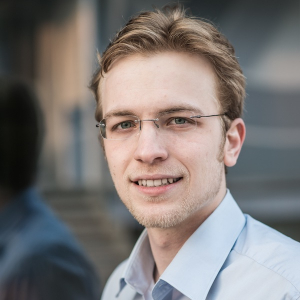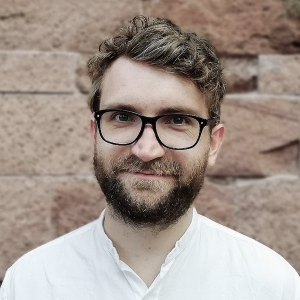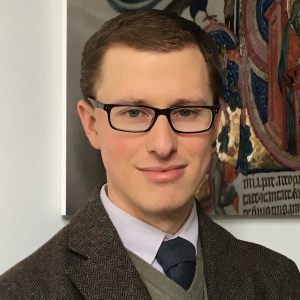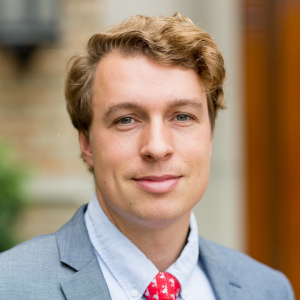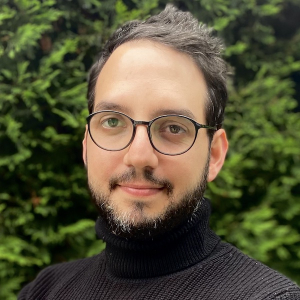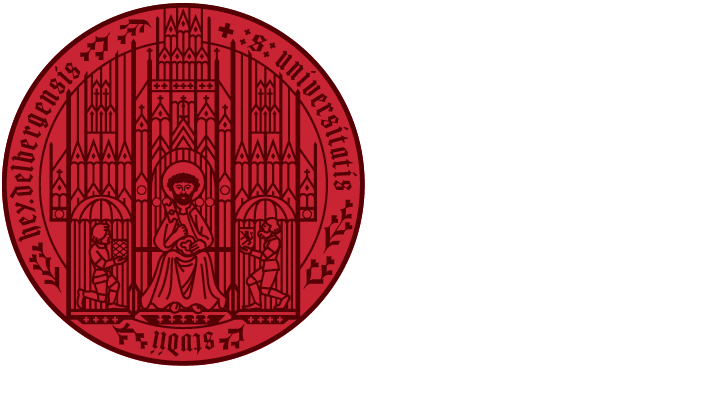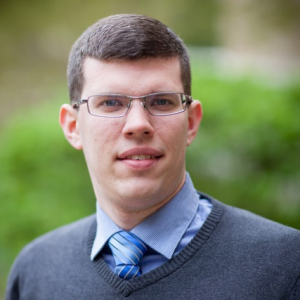 Award-Winning Work:
Award-Winning Work:
Eusebius the Evangelist
Current Position:
Jeremiah Coogan is a Marie Skłodowska-Curie Fellow in Theology and Religion at the University of Oxford.
Current Research Activities:
Coogan’s current book project, The Invention of Gospel Literature, analyses how readers in the Roman Mediterranean conceptualised “Gospel” as a category. This novel account of ancient literary criticism advances historical scholarship in the fields of religion and classics and informs ongoing conversations about the influence of philological practices, ancient and modern, on negotiations of knowledge, authority, and cultural value.
“God and spirituality” in the award-winning publication:
Throughout history, encounters with sacred texts have been shaped by technology. Eusebius the Evangelistaddresses the themes of God and spirituality by using Eusebius of Caesarea’s fourth-century reconfiguration of the New Testament Gospels to illuminate the pivotal role of technological and material transformations in both theological reading and liturgical encounters with sacred texts. Today we are experiencing a dramatic transformation in books and reading; the current digital revolution invites reflection on past changes in book technology and their impact on sacred texts. Eusebius the Evangelist offers a novel history of Gospel reading, analysing how readers – across diverse theological traditions, cultures, languages, and geographical regions – used a shared set of textual technologies to facilitate rich encounters with a fourfold Gospel. In this way, the monograph invites scholars to rethink established histories of Gospel literature and to discern the manifold ways in which readers, ancient and modern, encounter sacred texts.
Academic Address:
Faculty of Theology and Religion
University of Oxford
Gibson Building
Radcliffe Observatory Quarter
Woodstock Road
Oxford
OX2 6GG
United Kingdom
jeremiah.coogan@theology.ox.ac.uk
+44 (0) 7305 743443
Offenbarung und Glaube. Eine heilsgeschichtlich-hamartiologische Untersuchung der Theologie Dietrich Bonhoeffers // Revelation and Faith: A study of Dietrich Bonhoeffer’s theology in terms of redemptive history and hamartiology
Current Position:
Research Assistant at the Heidelberg School of Education (HSE), a joint institution of the University of Heidelberg and the Heidelberg University of Education
Current Research Activities:
I am working on a post-doctoral thesis exploring an protestant ethic of restraint. As a collaborator in the HSE research cluster, I am involved in projects on the tension between values-based education and value neutrality in pedagogical contexts.
„God and Spirituality“ in the award-winning publication:
The study examines the basic structures and concepts of Dietrich Bonhoeffer’s doctrine of sin based on their occurrence in his works. For Bonhoeffer, as a Lutheran theologian, faith is an ‘organ’ enabled by the Holy Spirit and through which divine revelation becomes perceptible. Only through this organ can essential ‘revelatory realities’ be conceived, of which sin is one, as Bonhoeffer determined. For him, it is the dual but asynchronous revelation of sin and gospel that breaks the power of sin and opens the way to discipleship. A crucial aspect in this process of liberation is the fundamental change in a human being’s relationship to the world and to the community of creatures (“mediation by Christ”), brought about by God’s life-giving Spirit.
Academic Address:
Heidelberg School of Education
Bergheimer Straße 104
69115 Heidelberg
Germany
E‑Mail: dietz@heiedu.uni-heidelberg.de
Award-Winning Work:
„Loving Your Neighbor Professionally“: Theology, Social Work, and the Limits of Moral Agency
Current Position:
Emily Dubie is a Lecturer in the Department of Religion at the University of Vermont.
Current Research Activities:
Emily Dubie is currently revising her dissertation for publication. This project draws upon in-depth qualitative interviews with thirty-five Christian social workers in the American southeast to develop a theological anthropology of caregiving pressed to its limits. Specifically, she examines how her research participants pray to discern the scope of human agency, especially when navigating the moral hazards of paternalism, burnout, and compassion fatigue.
„God and Spirituality“ in the award-winning publication:
„Loving Your Neighbors Professionally” studies the intersection of prayer and moral deliberation through interviews with thirty-five Christian social workers in the American southeast. As my research participants labor within a severely curtailed welfare system and in the face of overwhelming moral obligations, I consider how they pray to discern their own limits and coordinate their action with God’s. Ultimately, I conclude that these deliberations sustain their work and attune it to their capacities. Thus, while modern social theorists typically dismiss prayer as an otherworldly escape, my project argues that in certain places and times, this spiritual practice offers surprising possibilities for supporting social action.
Academic Address:
481 Main Street
Burlington, VT 05405
Email: emily.dubie@uvm.edu
Paul on the Human Vocation. Reason Language in Romans and Ancient Philosophical Tradition
Current Position:
I research and teach at the University of Fribourg, Switzerland as an assistant for Prof. Dr. Thomas Schumacher.
Current Research Activities:
My main research project at the moment is on Johannine anthropology in ancient philosophical context as part of the broader question of how to compare New Testament texts and ancient philosophy. I also work on a translation of Wrede into English and am in the early planning stages for a commentary on Philippians.
„God and Spirituality“ in the award-winning publication:
Romans 12.1–2 ranks among Paul’s most influential statements about spirituality and the life of Christ-followers as a service to God. Paul’s use of the phrase λογικὴ λατρεία in Rom 12.1 has long fascinated and puzzled his interpreters. Paul on the human vocation proposes a new explanation of Paul’s use of reason language in Romans 12.1 (λογικός) based on a detailed investigation of ancient philosophical parallels on the role of human beings in the cosmos, in which reason language and the idea of a human vocation are closely connected. It argues that Rom 12.1 appeals to the idea of a human vocation such as it is most clearly articulated in Epictetus (Diss. 1.16). Paul thereby claims that Christ-followers are now able to fulfil their human vocation by living in such a way that their lives produce signs of the new creation inaugurated in Christ.
Academic Address:
Assistent für Neues Testament
Departement für Biblische Studien
Universität Freiburg
Avenue de l’Europe 20
1700 Freiburg
Schweiz
Büro MIS 4217
Tel: +41 26 300 73 81
E‑Mail: simon.duerr@unifr.ch
Offenbarung und Entzug. Eine theologische Untersuchung zur Transzendenz aus phänomenologischer Perspektive
Current Position:
Research fellow (Wissenschaftlicher Mitarbeiter) in Systematic Theology (Dogmatics and Philosophy of Religion) at the Ruprecht-Karls-University of Heidelberg, Germany.
Current Research Activities:
Patrick Ebert is currently working on a habilitation thesis on the historical condition (conditio historica) of theology, i.e., the possibilities and impossibilities of a theology of history and its implications for a philosophy of science of theology.
„God and Spirituality“ in the award-winning publication:
Academic Address:
Universität Heidelberg
Theologische Fakultät
Kisselgasse 1 69117 Heidelberg
GERMANY
patrick.ebert@wts.uni-heidelberg.de
Paulus als Erzähler? Eine narratologische Perspektive auf die Paulusbriefe
Current Position:
Postdoctoral Researcher and Lecturer at the University of Basel, Faculty of Theology, Chair of Prof. Moisés Mayordomo
Current Research Activities:
I am currently preparing an English version of my results on the topic of narratives in Paul’s letters for the publisher Eerdmans and extending my narratological research on narrative perspective (focalization) to the Gospels and Acts. Moreover, I am leading an interdisciplinary project on probability and text interpretation (“Bayes and Bible”: https://theologie.unibas.ch/en/departments/new-testament/bayes-and-bible/). I plan to expand that focus on confirmation theory to an interdisciplinary public engagement project on the epistemology of conspiracy theories.
“God and Spirituality” in the award-winning publication:
The “narrative turn” in the cultural sciences and humanities has made it very clear that narration is a fundamental strategy with which humans – both as individuals and as societies – make sense of their world and their place within it. While the apostle Paul is arguably one of the most influential writers in human history, it is notable that his letters are largely missing from conversations about the stories that we tell ourselves today. This is largely due to the fact that thus far scholarship has treated Paul mainly as the prototypical thinker, the man of ideas, of doctrines, of argument. However, my study demonstrates that narratives constitute a vital backbone of Paul’s letter writing. He often tells explicit stories in order to help his congregations navigate their place in their ancient contexts, and at countless points we can reconstruct how passing references to events are part of implicit, mentally simulated narratives that give coherence to his thought. My results thus strongly encourage taking into account Paul’s voice in the current global and interreligious dialogue about God, with its renewed emphasis on the narrative dimension of spirituality.
Academic Address:
Theologische Fakultät
Nadelberg 10
4051 Basel
Schweiz
eMail: christoph.heilig@unibas.ch
Das andere Christentum: Zur transkonfessionellen Verflechtungsgeschichte von äthiopischer Orthodoxie und europäischem Protestantismus
Current Position:
Member of the academic staff in the Department of Religious History at the Leibniz Institute of European History (IEG) in Mainz.
Current Research Activities:
Stanislau Paulau is currently working on a monograph uncovering a global history of Eastern Christianity in the long nineteenth century. The research especially focuses on the role of mobility, mission, and inter-religious encounters.
“God and Spirituality” in the award-winning publication:
Das andere Christentum conceptualizes the relations between the Protestant Reformation and the wider world in a radically new way. Instead of looking at Protestantism as an initially exclusively European phenomenon that became global as a result of worldwide transmission and cross-cultural diffusion of reformatory impulses, Paulau’s work argues that Protestant Christianity itself can be seen as a product of – among other things – the increasing global interconnectedness of the early modern Christian world. The study focuses upon African, and more specifically Ethiopian Orthodox, agency and proves that non-European actors have a considerable share in the emergence and consequent transformations of European Protestant identities. Furthermore, it demonstrates that, vice versa, also Ethiopian Orthodox Christianity has been shaped by its transcontinental entanglements with European Protestantism. Thus, the study does not only profoundly challenge the Eurocentric narratives dominating the history of Christianity but also contributes towards a more inclusive and globally interconnected understanding of how new forms of spirituality and understanding of God have emerged.
Academic Address:
Leibniz-Institut für Europäische Geschichte
Alte Universitätsstraße 19
55116 Mainz, Germany
E‑Mail: paulau@ieg-mainz.de
Chrysostom as Exegete: Scholarly Traditions and Rhetorical Aims in the Homilies on Genesis
Current Position:
Alexander von Humboldt Post-Doctoral Fellow, Forschungsstelle Origenes, WWU Münster (2020–2023)
Current Research Activities:
My post-doctoral research examines examines the relationship between Jean Daniélou and Erik Peterson, who corresponded and promoted each other’s publications regarding the political implications of early Christian theology. They debated the theme of the ‘nation-angels’, championed by Origen of Alexandria. The idea that all peoples are governed by distinct metaphysical principles raised questions about nationalism and the liturgy, the ‘powers’ which impose themselves upon history, and the shape of human unity in eschatological perspective.
„God and Spirituality“ in the award-winning publication:
What is the relationship between ethics—that which is worthy of imitation, divine and human—and textual knowledge—the techniques and traditions used to study culturally sacred texts, such as the Bible? This book answers this question from the perspective of a systematic analysis of the 67 Homilies on Genesis attributed to John Chrysostom, a Greek-speaking Christian preacher of fourth-century Syrian Antioch. By focusing on his zetetic (‘questioning’) style it shows that Chrysostom programmatically framed complex exegetical discussions as the searching for ‘spiritual treasure’ under the surface of textual obscurity, thereby communicating learned traditions at the mass-level. A critical examination of his adaptation of sources advances our understanding about networks of knowledge among Late Antique Christian exegetical schools. In order to appreciate the dynamics between rhetoric and tradition, ‘Text-World’ cognitive poetic theory captures how Chrysostom connects Biblical history with his audience’s ethical concerns.
Academic Address:
Dr. Samuel Pomeroy
Katholisch-Theologische Fakultät
Seminar für Alte Kirchengeschichte
Domplatz 23
Raum 409
48143 Münster
The Fables of Jesus in the Gospel of Luke: A New Foundation for the Study of Parables. Studies in Cultural Contexts of the Bible 5 (Paderborn: Brill, 2021).
Current Position:
Justin David Strong currently holds an appointment in New Testament on the faculty of Protestant Theology at the Johannes Gutenberg University of Mainz.
Current Research Activities:
Strong is presently completing several articles addressing further implications of ancient fable literature and has two large-scale projects in the works. The first is a trans-disciplinary project reading the New Testament with Animal Studies. The second project addresses literary issues in the Gospels and the Synoptic Problem from the context of ancient vulgar literature that was circulated and rewritten at the popular level.
„God and Spirituality“ in the award-winning publication:
The parables of Jesus, especially those of Luke’s gospel, have had an immense impact on the West. For all their significance, from both historical and literary perspectives, the “parable” has remained enigmatic. According to the consensus, Jesus is the first figure in recorded history to use the parable with any regularity. Scholars have been left to speculate about the origin of this genre, often considered new and unique to Jesus. My work moves past this implausible consensus, showing that the well-established fable genre provides a straightforward and comprehensive explanation for “parables.” The ancient fable has been ignored by most classicists and is virtually unknown to biblical scholars until now. From matters of form and interpretation, to new first-century authors and hundreds of new examples for comparison, this work introduces the world of the ancient fable to biblical scholarship as a new foundation for the study of parables.
Academic Address:
Johannes Gutenberg-Universität Mainz
Evangelisch-Theologische Fakultät
Saarstraße 21
55099 Mainz
Germany
jstrong@uni-mainz.de
Sovereignty and Event: The Political in John D. Caputo’s Radical Theology
Current Position:
Research Fellow in the Ecumenical Institute at the Ruhr-Universität Bochum, Germany. Research Associate in the Department of Systematic Theology and Ecclesiology, Stellenbosch University. Research Associate in the Department of Historical and Constructive Theology, University of the Free State.
Current Research Activities:
Expanding on several themes in this book, my present research intends to correct some of the enthusiasms for transcendence in continental philosophy of religion by refocusing attention on the embodied nature of religious experience. Undertaken as a Habilitationsschrift (the German second PhD) funded by the DFG (Deutsche Forschungsgemeinschaft / German Research Foundation, 2021–24), the project draws on the phenomenology of embodiment, materialist studies, and philosophy of religion, to explore an original account of the ‘religious body’ that intersects with themes in theological anthropology.
„God and Spirituality” in the award-winning publication:
Sovereignty and Event argues for the political significance of a certain postmodern spirituality. With reference to the political theology of Carl Schmitt and the growing crisis of democracy, it develops an account of the political in the radical theology of the American philosopher, John D. Caputo. Re-tracing the development of Caputo’s work and engaging the debates around his philosophy of religion, it argues for the materially engaged, and thus politically significant dimensions of a radical theology that is ‘lived’ in the interstices of thisworld. In the face of much global suffering and uncertainty, Sovereignty and Event suggests that the theopoetics of radical theology offers an alternate theo-political ontology, which persists in uncertainty but with the certitude of its obligation toward the Other. Insofar as radical theology offers a renewed political vision, it thus also defends the relevancy of postmodern thought for expressions of contemporary Christian spirituality.
Academic Address:
Dr. Calvin D. Ullrich
Evangelisch-Theologische Fakultät
Universitätsstr. 150
GA 7/152
44801 Bochum
Email: ullrichc@sun.ac.za / Calvin.Ullrich@rub.de



